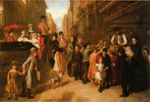
Magnifying a Truth
"If a man could feel, / Not one day, in the artist’s ecstasy, / But every day, feast, fast, or working-day,
/ The spiritual significance burn through / The hieroglyphic of material shows, / Henceforward
he
would paint the globe with wings [. . .]” (7.854-62).
Elizabeth Barrett Browning's Aurora Leigh (1856)
Points for Reflection
Aurora Leigh, Book Seven
- why might EBB allow Aurora to be cared for, post-escape, by a woman involved in a love affair (7.22-35-48)?
- does it seem possible for a young woman to be so ignorant as to not know eight months into a pregnancy that she’s pregnant? What do you make of Aurora’s initial reaction to discovering her situation? Also, what does Marian’s reaction to the idea that she’s pregnant suggest about children resulting from rape (7.46-66)?
- at what moment in the tale does Aurora’s journal about past events become a record of current events?
- why does Aurora choose not to write Romney about Lady Waldemar’s complicity in Aurora’s fate?
- how does Aurora believe she could have saved Romney?
- what sexual stereotypes does Aurora reinforce, and which question, as she imagines Romney’s marriage to Lady Waldemar, then writes a letter to the distasteful woman?
- in the letter Aurora writes Lady Waldemar, she calls on the lady to be a good wife to Romney. Is this letter likely to inspire such faithfulness (7.278-374)?
- does Aurora interrogate or reinstate the (then) conventional notion that a woman with a “bastard” child is “defiled” (7.390)?
- what might prompt Aurora’s delusions about being in a church’s belfry, overwhelmed by the loud clanging of the bells (7.398-417)?
- does Aurora’s description of Nature, as visible through the windows of the moving train, change significantly as they move from France into Italy?
- at what point does Aurora finally admit to herself that she loves Romney?
- which does Aurora believe has a stronger hold on Truth--her book or God?
- distill the central thesis of Aurora Leigh’s newly published book from her reflections on the book’s thematic contents in lines 7.761-854. What is she suggesting about the intersection of spiritual experience, the natural world, and Art?
- Aurora Leigh is an eloquent defender of Art/poetry, but she also recognizes its limitations—what are they?
- lines 7.901-1039 sound like a long, emotional lament or keening session, exacerbated by the weather (pounding heat), but motivated by what exactly?
- does Aurora’s conjecture about the possible lives of those she passes on Florentian streets (7.1226-61) constitute an invasion of privacy?
Aurora Leigh, Book Eight
- why do Romney and Aurora continually speak past one another during their conversation?
- do Aurora’s unvoiced thoughts mirror the words she actually speaks aloud to Romney throughout this tête-à-tête?
- are the terms of Romney’s epiphany consistent with the ideas Aurora attempted to place in the book which catalyzed Romney’s awakening? Did the book have the intended effect?
- what social and spiritual repercussions does Romney identify as consequent to focusing on material needs alone?
- what key differences have distinguished Romney’s democratic impulses and practice from Aurora Leigh’s?
- Aurora Leigh suggests that she and Romney, back at the close of Book Two, made a similar mistake, though thinking differently of how to better humanity—what was that mistake?
- as parsed by Romney and Aurora, what are the benefits and drawbacks to work?
- can you figure out Romney’s grammatical metaphor in 8.665-69?
- having concluded that focusing on physical remedies that ignore the soul is destructive (8.744-759), and that human effort can only temper--not eliminate--Evil, Romney suggests that God allows human suffering for what purpose (8.762-66)?
- what tone dominates lines 8.767-83?
- what does Romney suggest about the limits of the scientific method, when considering the ills of society?
- Aurora actually calls women to speak out their ideas less often. Why? Do these sound like the words of an ardent feminist?
- what is Romney’s point in 8.873-81?
- what about Romney’s social vision does he consider to have been wicked (8.889-98)?
- whose idea was it to burn down Leigh Hall, a party who actually instigated the fire (8.917-39)?
- what about the charred ruins of Leigh Hall does Romney think make it worthy of being gazed upon by a poet (8.1004-1007)?
- who is the lamb, mangled by wolves, whom Romney considers to be his “very wife” (8.1062)?
- what does Romney mean by the claim that “‘Auroras must not come to spoil [his] dark’” (8.1090)?
- what two big reveals does Book 8 dance around until the chapter’s conclusion?
- what critique does Romney level at Aurora, suggesting that her fault brings her down to his level (8.1223-38)?
- reexamine Aurora’s longstanding denial that she loves Romney. How does she unwittingly undercut her own case all the way up through Book 8?

Poverty and Wealth (1889)
William Powell Frith
Dr. Paul Marchbanks
pmarchba@calpoly.edu
![]()
